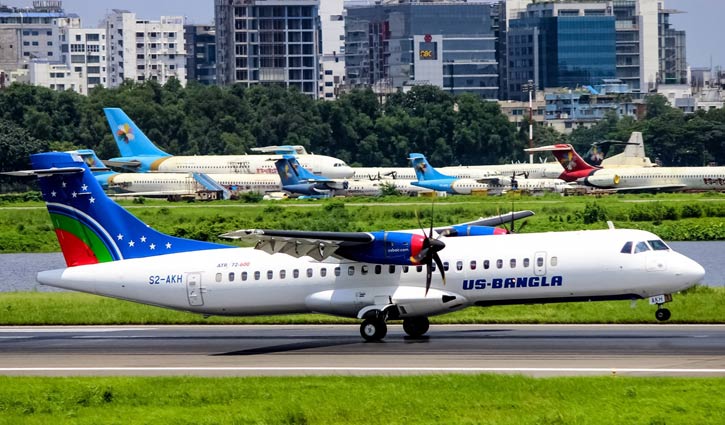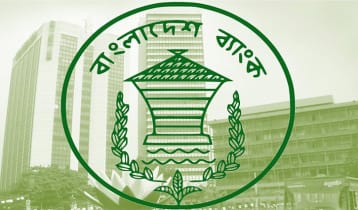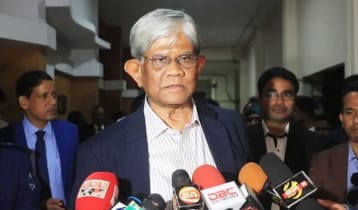Private airlines: Dreaming requires the help of others
Kamrul Islam || risingbd.com

File photo
For the past twenty-five years, private airlines have been struggling to survive in Bangladesh’s aviation industry. The actual picture in this fight is by no means pleasant. 8 to 9 private airlines from inception till the moment before it became history many demands were unfulfilled.
Hangar facilities for private airlines were among the many demands. After almost 25 long years, the regulatory authority civil aviation has fulfilled that expectation. Private airlines expressed their gratitude. Hangar facilities have been provided to passenger airlines for smooth execution of aircraft maintenance activities with ultimate emphasis on passenger safety. But airlines that have been shut down in the past days have also bid many times to get hangars but were forced to go out of business before the demands were met.
Aeronautical charges. These charges usually include landing, parking, route navigation, security. Private airlines have always made reasonable demands to civil aviation to reduce charges to maintain business momentum. These charges directly increase operational costs, which impact passenger fares. There is no option to cut charges to keep passenger fares affordable.
In the case of domestic airlines, the need to determine flight handling charges on domestic and international routes equally has been mentioned by the airlines. Aeronautical charges in particular are about nine to ten percent higher on international flights than on domestic flights, which a domestic airline would never expect.
If the charges are not paid on time, a surcharge of 6 percent per month and 72 percent per annum has to be paid. Which is much more than any neighboring country. Private airlines have been demanding since the beginning to fix the surcharge at 12 percent. But due to non-fulfillment of those demands, the airlines have been forced to go out of business with outstanding charges and surcharges. High rate of charges appears to be the main reason for non-payment of charges on time.
From time to time it is seen in the media that various airlines especially the closed airlines and civil aviation owe thousands of crores in charges and surcharges from the national airlines. If charges and surcharges were fixed at reasonable rates, civil aviation would not have to bear huge sums of money.
Non-operational airlines GMG, United and Regent have close to Taka 1,000 crore in outstanding accounts, which it is doubtful will ever be collected. Apart from this, despite being in operation for a short period of time, the Civil Aviation Authority also owes arrears to Aero Bengal, Air Parabat, Best Air, Aviana Airways. Which has been considered as "Janam Baki". Apart from this, civil aviation owes various charges to many foreign airlines.
Non-Aeronautical Charges There are various spaces available for hire to conduct activities within the airport. Whether it is business or not, the authority also sees the trend of rent increase at the end of the year. Keeping non-aeronautical charges at a tolerable level will make it easier for airlines to survive.
Often different charges are levied irrespective of time. For example, during the COVID period, the aviation and tourism sector was severely disrupted globally, where various countries tried their best to sustain the sector, Bangladesh has imposed new charges on aviation, airport development and security sector. Which seemed absurd to the time. Because airport development is also necessary, security is also necessary, but it is very important to keep time in mind while charging.
Bangladesh Petroleum Corporation popularly known as BPC. A service oriented organization. But looking at the activities of BPC, it seems that monopolistic business is the goal. In determining the price of jet fuel, the aviation sector of the country has been given priority over the calculation of profit and loss. The high cost of jet fuel is playing a major role behind the instability of Bangladesh aviation. The reason is that almost 50 percent of the operational cost of any route is the cost of jet fuel. Bangladesh aviation will never be able to compete with foreign airlines if jet fuel pricing is not done carefully.
There is often a mismatch in pricing with the international market. During COVID and post-COVID, BPC was engaged in a series of price hikes to overcome previous losses in electric momentum. But even though the price of jet fuel has come down in the international market, the price of jet fuel per liter is decreasing at a snail's pace. Which cannot be desirable in any way.
In the aviation and tourism sector, the passenger growth rate in the summer schedule is low, along with the decrease in South Bengal passengers due to the opening of the Mawa-Bhanga Expressway and Padma Bridge in the country, the airlines are trying to maintain the service quality by reducing the number of flights on the Barishal and Jashore routes.
Reopening the closed airports within the country to maintain the mobility of the country's air routes will give the domestic airlines a chance to survive. Along with this, the entire country will be connected by air.
Biman Bangladesh Airlines, the leading national airline, has been claiming the label playing field of private airlines since the beginning. "Extra Khatir" is always seen in obtaining jet fuel or paying dues to Civil Aviation Authority. However, without paying thousands of crores of taka, profit calculations are often seen in various media.
In order to maintain the stability of the country's aviation, if the dual policy of Bangladesh Petroleum Corporation, Civil Aviation Authority or Biman Bangladesh Airlines is avoided, the domestic airlines will be consolidated in the future. The march forward will be strengthened by reining in the march of closure of private airlines.
Since the beginning, the private airlines have been dreaming of surviving in the air transport business with the direct cooperation of Bangladesh Petroleum Corporation, Civil Aviation Authority, Ministry of Civil Aviation and various government service and policy making institutions.
The writer is General Manager-Public Relations, US-Bangla Airlines
Dhaka/AI




















